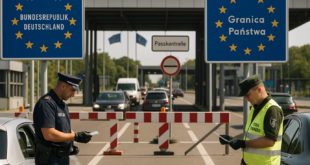German Chancellor Angela Merkel has called for a ban on the burka in public life “wherever possible” during her conservative Christian Democratic Union (CDU) party congress in Essen, officially launching her election campaign to hold on to Germany’s Chancellery.
Speaking to sustained applause from her CDU delegates, Merkel said the full-face veil worn by some Muslim women in Germany was not compatible with German law.
“German law takes precedence over Sharia,” Merkel said. “The full-face veil is not acceptable in our country. It should be banned, wherever it is legally possible.”
The burka is a flowing outer garment worn by some Muslim women whose purpose it is to mask the face in accordance to Sharia, the law that governs the actions of Muslim men and women.
If approved, the ban would likely prohibit the burka for civil servants, in schools and universities and while driving.
It also follows the lead of several other European countries adopting legislation banning the burka.
Merkel, who confirmed her intention last month to run for a fourth term, was overwhelmingly re-elected on Tuesday by CDU delegates as the party’s Chairwoman.
Merkel has been lauded for her government’s response to Europe’s migrant crisis, but she has also been progressively put under pressure, and is suffering hits to her popularity.
Germany took in nearly one million refugees in 2015 and recent terror attacks in Munich and Ansbach this year, as well as a series of sexual assaults linked to refugees in Cologne last winter, have given rise to anti-immigrant sentiment in Germany.
A stinging defeat in Merkel’s own constituency during regional elections in September by far-right and anti-immigrant Alternative for Germany (AfD) is largely seen as reaction against Merkel’s open border policy to asylum seekers.
Merkel’s Tuesday call for a ban on the burka, however, is not the first, and hers echoes a similar call previously made within her own party.
In Germany it is already forbidden to cover one’s face to point of masking one’s identity during public gatherings and there are a myriad other laws in place governing the extent by which a face may be covered.
Veils for instance must be lifted for passport photos and security inspections in courthouses. Federal German Police officers may request a veiled woman to reveal her face in a private room with a female officer during security checks at airports.
In 2014 a court upheld a case in which schoolchildren can be banned from wearing face veils while in school, ruling it prevents the student from being identified, hinders communication and integration within the rest of the class.
But a full outright ban on the burka is unlikely, as it would violate Germany’s constitutionally enshrined law on freedom of religion.
Mathias Rohe, an expert on law and Islam, speaking to Spiegel Online in August said the only way in which Germany’s religious freedoms can be scaled back is when “open communication” is obligatory.
Unless the constitution is amended, a complete ban on the garment is impossible.
But Merkel’s call for the ban is a clear indication of her willingness to reinforce German law and suggests a harsher tone than in years past.
During her speech in Essen, she vowed last year’s migrant crisis “should not and cannot” repeat itself.
“Here in Germany the laws of our country count, for each and everyone in the same way. Without exception,” Merkel said.
If the burka ban moves ahead in Germany it would join the likes of France, Belgium, Switzerland, Italy, Spain and the Netherlands, with either partial or total in place burka bans.
Only France and Belgium have fully banned the burka in Europe.
 THE AFRICAN COURIER. Reporting Africa and its Diaspora! The African Courier is an international magazine published in Germany to report on Africa and the Diaspora African experience. The first issue of the bimonthly magazine appeared on the newsstands on 15 February 1998. The African Courier is a communication forum for European-African political, economic and cultural exchanges, and a voice for Africa in Europe.
THE AFRICAN COURIER. Reporting Africa and its Diaspora! The African Courier is an international magazine published in Germany to report on Africa and the Diaspora African experience. The first issue of the bimonthly magazine appeared on the newsstands on 15 February 1998. The African Courier is a communication forum for European-African political, economic and cultural exchanges, and a voice for Africa in Europe.
































